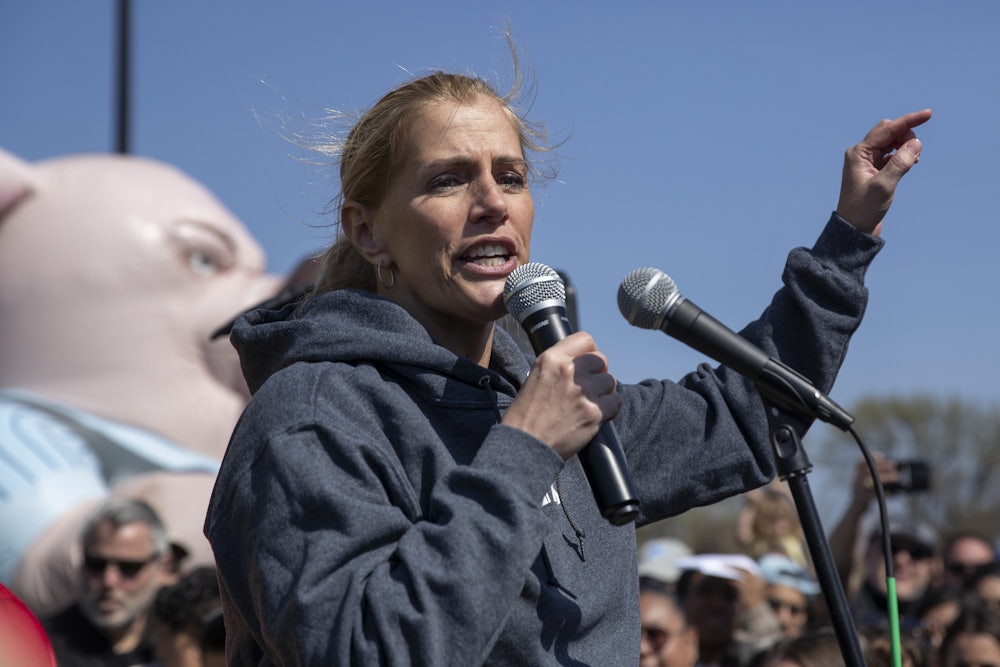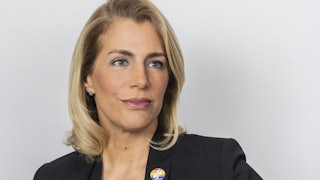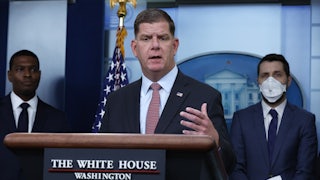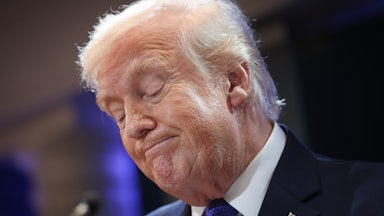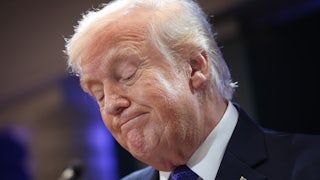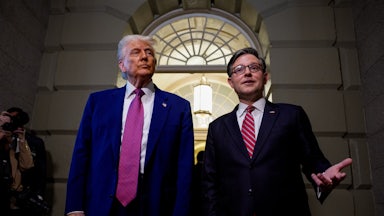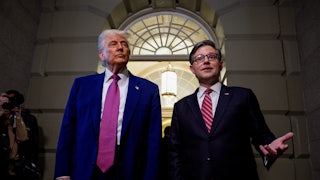Labor Secretary Marty Walsh will be the first member of President Joe Biden’s Cabinet to resign; he’s leaving to become executive director of the NHL Players Association, at an annual salary of $3 million. We’ve known this for 10 days, but now it’s official. He’ll be gone in mid-March. Time to think about who’ll replace him.
I propose Sara Nelson, the energetic and shrewd president of the Association of Flight Attendants.
As I noted in September, Walsh was not a great labor secretary. He was uninterested in regulatory matters and didn’t get a lot done. He was good at the glad-handing part of the job, but he didn’t do enough of it with Congress because he never bothered to move down from Boston, where he was mayor when he assumed the post. That seemed emblematic of his weak commitment.
Even Walsh’s most significant accomplishment—avoiding a rail strike before the midterm elections—came to grief when four unions rejected the contract Walsh negotiated because it didn’t give rail workers any sick days. In the end, Congress imposed the contract on the unions, ignoring pleas from Senator Bernie Sanders that seven days of sick leave be added. This allowed House and Senate Republicans to oppose it on those grounds, positioning themselves in the mighty battle for working-class votes as pro-union when they are anything but.
Walsh was a big disappointment because he was a former union leader, and the Labor Department hadn’t had a secretary with a union card in nearly half a century. (The last one was William Usery Jr., a former leader in the International Association of Machinists, who held the job under President Gerald Ford.) There was a time when being a union member was an absolute requirement. The first three labor secretaries, under Presidents Woodrow Wilson, Warren Harding, Calvin Coolidge, and Herbert Hoover were all recruited from labor, and the nomination of the fourth, Frances Perkins, was opposed by the American Federation of Labor because she wasn’t. Perkins went on, of course, to be the greatest labor secretary in history.
Walsh’s nomination was a return to the pre-Perkins tradition after 16 dreary months of the Trump-installed Eugene Scalia, a union-busting corporate attorney (and yes, son of you-know-who). Walsh had run the Building and Construction Trades Council for Greater Boston, and before that, he’d been president of Local 223 of the Laborers’ International Union of North America, or LiUNA. It was good to see a union guy take the job. But alas, Walsh was no Frances Perkins.
Now Biden has the chance to install a more formidable labor leader. The idea of making Nelson labor secretary originated with Senator Bernie Sanders, and it’s a good one. (Sanders’s other candidate for the job, Robert Reich, is a less good idea; Reich didn’t get all that much done last time he had the job.) As Sanders noted in a letter last week to Biden, Nelson is “a very strong communicator of progressive values” and “has a very thorough understanding of federal labor laws.” Nelson is such a good fit that I note (with mild annoyance) Morgan Clendaniel of Fast Company got a piece up pushing Nelson before me. But let that sink in. A business magazine is recommending an eminent labor leader for the job. Meanwhile, the public judges unions more favorably than at any time since the zenith of President Lyndon Johnson’s Great Society. President Biden, take note.
I’d heard for years that Nelson was a dynamic speaker. I finally saw her in action earlier this week at a conference hosted by the Open Markets Institute, a nonprofit that promotes antitrust. (To watch her speech, click here and forward to 6:45:37.) Nelson came at the end of a long day of panels, and she brought the flagging audience back to life. “They have stolen our labor,” she said.
They have turned the clocks back. They have taken away the power over the working class and it is time to rise up and reclaim that and understand that this labor movement is the heart of the CIO, but without the racism and sexism that held us back.
When’s the last time you heard a Cabinet official talk like that?
In a panel after Nelson’s speech, Helaine Olen of The Washington Post asked Nelson if she’d take the Labor job. (See 7:05:08.) Nelson cleared her throat. “Let me just say that Uncle Bernie put my name out there before I knew he was going to,” she said. Nelson then praised the “extraordinary acting secretary,” Julie Su, who is the leading candidate for the job. “There’s a lot of jobs for all of us to do,” she said, “and I think that I am doing a job that I love right now and it’s really important and it would be—I’ll just leave it here: a direct request from the president would be hard to turn down.”
So: yes.
Su is a good candidate for labor secretary. She’s well-regarded in the department and, as an Asian American, she has the support of the Congressional Black Caucus and the Congressional Asian Pacific American Caucus. (Biden has no Asians in his Cabinet.) Her experience is almost spookily reminiscent of Perkins’s before she joined FDR’s Cabinet. Perkins got involved in labor issues as a result of witnessing, at age 30, the 1911 Triangle Shirtwaist Factory fire in Greenwich Village. Su won a MacArthur “genius” grant for successfully representing, one year out of law school, undocumented Thai garment workers putting in 18-hour days at a Southern California sweatshop. As New York state’s industrial commissioner, Perkins fought child labor and other abuses. As California’s labor secretary, Su pushed through Assembly Bill 5, or AB5, a misclassification law, currently being challenged in state court, that drastically limits the extent to which businesses can rely on gig labor.
Unfortunately, this last accomplishment may render Su unconfirmable. Conservatives successfully blocked the nomination of David Weil for wage and hour administrator partly because Weil articulated much milder limits on gig labor when he held the job under President Barack Obama. Su squeaked by on Senate confirmation last time, but since then anti-labor Democrats Kyrsten Sinema, Mark Kelly, and Joe Manchin have gotten bolder in bucking their party.
Nelson would be harder to oppose because her job calls on her to do battle on a regular basis with one of the most disliked industries in the United States. Even Republicans can’t stand the airlines. “She kind of scares me,” Jonathan Ornstein, chief executive of Mesa Airlines, told The New York Times after she stated at a congressional hearing that Mesa was a “bottom-feeder” on wages. (Walsh never scared anybody.) “I think she is truly one of the most effective labor leaders I have ever met,” Ornstein said.
Another asset Nelson brings to the table is a remarkable flair for applying political muscle:
- In 2013, Nelson appeared on various TV outlets, including Today and Morning Joe, to protest TSA’s decision to allow passengers to bring knives on airplanes. TSA backed down.
- In December 2019, the government shut down when Trump refused to sign a spending bill because it didn’t include funding for the border wall. It was the longest shutdown in history, lasting 35 days. Unpaid air traffic controllers and TSA screening agents called in sick en masse. By January 20, Nelson had had enough. She called for a general strike and then, four days later, marched down to Reagan National Airport to deliver a speech. Visibly furious, she said, “No one will get out of this unscathed if we do not stop this shutdown.” Nelson’s speech immediately went viral. Trump reopened the government the following day.
- In March 2020, Nelson persuaded then Democratic Representative Peter DeFazio, chairman of the Transportation and Infrastructure Committee, to reserve half the $50 million allocated to the airlines through the third Covid stimulus bill specifically for payroll, and then another $15 billion nine months later. By denying airlines the latitude other industries enjoyed to spend stimulus funds as they saw fit, Nelson was able to limit drastically the number of Covid furloughs for flight attendants and other airline workers.
With political skills like that, maybe Nelson could figure out how to pass the Protecting the Right to Organize Act, which would repeal the most troublesome parts of the 1947 Taft-Hartley law that has handicapped organized labor for three-quarters of a century.
Nelson enjoys a rare privilege as a labor leader: At a time when only 6 percent of all private-sector workers are unionized, more than 80 percent of the airline industry is unionized at three of the four major airlines. (The fourth, Delta, is only about 20 percent unionized.) At the Open Markets conference, I asked Nelson whether she had any thoughts about expanding union representation elsewhere (7:27:27).
Nelson replied that union drives at news organizations have been helpful in getting reporters to “understand the value” of union affiliation. She also said that she’s working on a project “to make sure that any worker who wants to form a union in their worksite can actually get help to do that.” She said she wasn’t ready to provide details, but when I pressed her, she indicated that it will be funded by private foundations. The lack of philanthropic interest in promoting organized labor is a scandal of long standing. Even rich liberals don’t usually like labor unions. If Nelson can break through that, it will be a tremendous accomplishment.
It would be thrilling to see Nelson bring this creativity and drive to the Labor Department. Biden is the most pro-labor president since Harry Truman, but until now most of the heavy lifting has been done by Jennifer Abruzzo, general counsel at the National Labor Relations Board. Biden should have a strong labor secretary too, and until now he hasn’t had one. Making Nelson labor secretary would help him make up for lost time.
